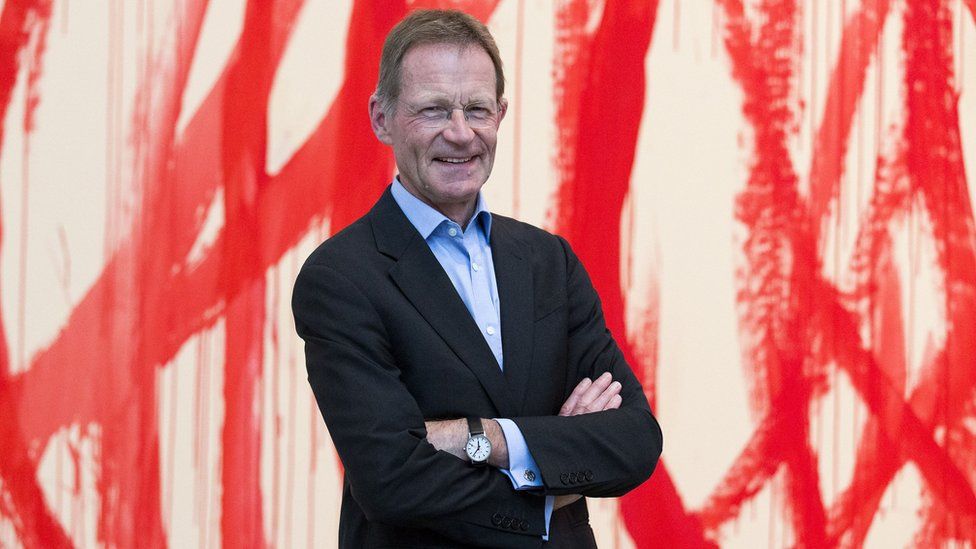Sir Nicholas Serota to leave Tate for Arts Council role
-
Published

Sir Nicholas Serota is to step down as director of the Tate galleries after nearly 30 years to become chairman of Arts Council England.
He will replace Sir Peter Bazalgette, who was appointed as chairman of ITV earlier this year.
Tate chairman Lord Browne described Sir Nicholas as "one of the world's greatest museum directors".
Sir Nicholas, who has transformed the success of the Tate, said the role had been an "exciting challenge".
He will formally take over the new post in February but is to continue as director of the Tate until later in 2017.
'Superb pedigree'
Sir Nicholas, who has been director for 28 years, said: "Over the past 30 years there has been a sea-change in public appreciation of the visual arts in this country. Tate is proud to have played a part in this transformation.
"I leave an institution that has the potential to reach broad audiences across the UK and abroad, through its own programmes, partnerships and online."
Announcing Sir Nicholas's appointment at Arts Council England, Culture Secretary Karen Bradley told the House of Commons he had "a superb pedigree in the arts".
Lord Browne said: "Under his leadership, Tate has become a preeminent cultural organisation nationally and internationally and one of the most visited in the world."
The announcement of Sir Nicholas's departure from the Tate comes in the same week it was revealed that Martin Roth was leaving the Victoria & Albert Museum after five years.
Time lapse film of building Tate Modern's new extension
Analysis - Will Gompertz, BBC arts editor
Nicholas Serota's comment about "potential" reflects three aspects to his character: a predisposition not to blow his own trumpet, a relentless drive, and a challenging nature.
He doesn't want the next incumbent to think he or she has an easy ride: there is work to be done. He might be leaving, but he's setting the agenda before he goes.
And who might that person be to come in and realise Tate's "potential"?
The front-runner I reckon is Maria Balshaw, who has done a splendid job as the boss of the Whitworth in Manchester, a role she's coupled with being leader of the city's cultural programme.
Sir Nicholas was born in London in 1946. He studied History of Art at the University of Cambridge and the Courtauld Institute.
He became chairman of the new Young Friends of the Tate in 1969 and worked as a regional officer for the Art Council's visual arts department before being appointed director of the Museum of Modern Art in Oxford in 1973.
In 1976, he became director of the Whitechapel Gallery, where he remained for 12 years.
He was appointed director of the Tate in 1988 - the same year he began chairing the Turner Prize, which was redefined as a showcase for contemporary art under his leadership.
The Turner Prize went on to become the world's preeminent art award and is now held outside London every alternate year. Sir Nicholas stopped chairing the judging panel in 2007.
He oversaw the opening of the Tate Modern on London's South Bank in May 2000 and a renovation of the Tate Britain, located on Millbank, which was completed in 2013. The Tate's family of galleries also includes the Tate Liverpool and the Tate St Ives.
Earlier this year, he oversaw the opening of a new extension to the Tate Modern - a pyramid-like tower called the Switch House, which increased the size of the gallery by 60%. A record number of people visited on the extension's opening weekend.
He has also recently curated a number of high-profile exhibitions, including Donald Judd, Howard Hodgkin, Cy Twombly, Gerhard Richter and Matisse: The Cut Outs.
In 2014, Sir Nicholas was named the most powerful figure in the art world.
Follow us on Twitter @BBCNewsEnts, on Instagram, or if you have a story suggestion email entertainment.news@bbc.co.uk.
-
-
Published8 September 2016
-
-
-
Published16 February 2016
-
-
-
Published4 August 2016
-
-
-
Published20 June 2016
-
-
-
Published23 October 2014
-